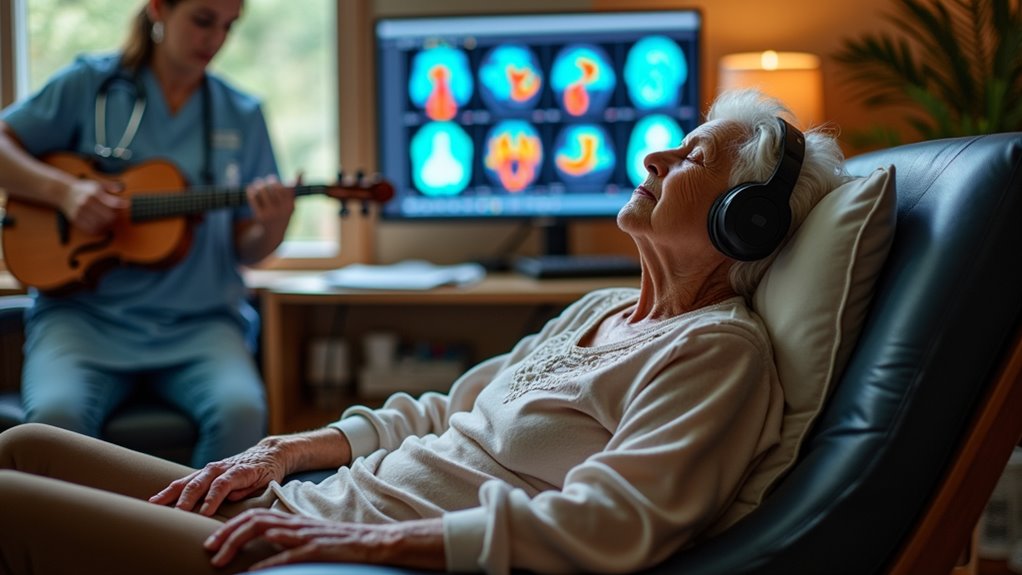Music therapy offers you powerful, evidence-based benefits for both mental and physical health. You’ll experience reduced pain and stress through sound interventions, improved emotional processing, and enhanced cognitive function. It strengthens your memory retention, aids sleep quality, and builds social connections through structured musical activities. Clinical studies show significant improvements in anxiety, depression, and motor rehabilitation through therapeutic musical engagement. Uncover how these proven techniques can transform your healing experience.
Pain Relief and Management Through Sound

While conventional pain management often relies on medication, sound-based interventions offer a powerful non-pharmacological approach to pain relief.
Through therapeutic rhythm and auditory stimulation, you’ll experience reduced heart rate, lowered blood pressure, and improved breathing patterns. Music therapy techniques enable enhanced self-regulation and connection with others during treatment. Sound frequency interactions trigger neuroplasticity effects in your brain’s pain network, activating the mesolimbic dopaminergic system for natural pain modulation.
During soundscapes exploration and musical improvisation, your sensory engagement helps redirect attention away from discomfort. Incorporating healing instruments like singing bowls and tuning forks can deepen the therapeutic effects.
Studies show mean pain reduction of 3.22 points through these interventions, particularly beneficial for chronic pain management. The emotional alignment created through sound therapy amplifies your body’s natural healing responses, elevating oxytocin production while reducing stress hormones like cortisol.
This scientific approach to pain management demonstrates measurable physiological and psychological benefits.
Emotional Processing and Expression

Through its direct influence on the brain’s limbic system, music therapy creates powerful pathways for emotional processing and expression. When you engage with music therapeutically, neural activation triggers the release of dopamine and serotonin while reducing cortisol, establishing ideal conditions for mood regulation and cognitive processing. Certified professionals use GIM techniques to guide patients through visualization exercises while listening to carefully selected music.
Music offers creative outlets for emotional expression, particularly beneficial if you’re struggling with verbal communication or trauma recovery. Through therapeutic songwriting and shared experiences, you’ll uncover safe channels for processing complex feelings and memories. You don’t need to rely on words alone instruments and movement provide powerful nonverbal communication alternatives. Group music therapy sessions enhance social support while working through emotional challenges.
You’ll develop emotional resilience as you practice identifying and managing challenging emotions. This strengthening occurs through coordinated neural networks, supporting lasting improvements in your psychological well-being and interpersonal relationships.
Stress Reduction and Relaxation

When you listen to therapeutic music, your brain waves shift from high-frequency beta patterns associated with stress to calmer alpha and theta waves that promote relaxation and healing.
Your breathing naturally synchronizes with music’s tempo, and selecting pieces between 50-80 beats per minute can guide you in the direction of deeper, more regulated breathing patterns. Music has been proven to directly affect cardiovascular health by lowering blood pressure and reducing heart rate when individuals engage in regular listening sessions.
Recent studies have shown that personalized music therapy can help adults with mild intellectual disabilities achieve immediate stress relief through carefully selected playlists and receptive interventions.
Calming Brain Wave Patterns
Recent neuroscience research demonstrates how specific frequencies in music directly influence brain wave patterns, leading to measurable reductions in stress and anxiety.
Through carefully calibrated sound healing techniques, music therapy activates neural pathways that promote relaxation and emotional balance. Your brain’s response to specific brainwave frequencies can shift consciousness from heightened beta states to calmer alpha and theta waves. Research shows that soothing classical music can significantly enhance these therapeutic effects. This therapeutic approach has proven particularly effective at lowering cortisol levels while providing comfort and emotional support.
- Music perception studies show a 60% reduction in cortisol levels when listening to therapeutic frequencies.
- Binaural beats synchronize brainwave patterns, enhancing emotional resonance and mental clarity.
- Delta and theta waves induced through specialized music promote deep relaxation and stress relief.
This neurological approach to music therapy offers measurable benefits, making it an evidence-based tool for managing anxiety and promoting comprehensive mental wellness.
Deep Breathing Through Music
Deep breathing techniques combined with music therapy create a powerful synergy for stress reduction and relaxation.
Studies show that when synchronized with music, controlled breathing markedly reduces anxiety levels, heart rate, and respiratory rates. The structured rhythm of music provides a natural guide for deep breathing exercises, making them more effective and easier to maintain.
Clinical research demonstrates that music-guided breathing sessions help regulate blood pressure and promote ideal oxygen saturation. The combination improves emotional regulation by activating the parasympathetic nervous system, triggering a relaxation response. When practiced twice daily for 30 minutes, this therapeutic approach shows significant improvements in patient anxiety reduction and physiological parameters.
Clinical music therapists conduct these sessions using evidence-based methods to ensure optimal outcomes.
You’ll experience enhanced focus and mental clarity as your body responds to this therapeutic approach.
For maximum benefit, practice deep breathing with calming music for 15-20 minutes daily. This evidence-based intervention offers a safe, accessible method for managing stress and achieving deeper states of relaxation.
Cognitive Function Enhancement
Through extensive clinical research, music therapy demonstrates remarkable capabilities in improving cognitive function across diverse populations. Clinical studies reveal that structured music interventions activate multiple brain regions simultaneously, promoting neuroplasticity stimulation and improved cognitive performance.
- Active music therapy interventions show an 85.7% improvement in cognitive engagement strategies.
- Receptive music techniques using personalized playlists boost memory recall and verbal fluency.
- Structured musical activities strengthen neural pathways and enhance problem-solving abilities.
When integrated into therapeutic protocols, music therapy provides measurable cognitive benefits through rhythmic stimulation and melodic recognition.
The combination of active participation and receptive listening creates powerful cognitive improvement effects, particularly in areas of memory, attention, and executive function.
Research validates music therapy’s role in maintaining and improving cognitive abilities across treatment populations.
Motor Skills and Physical Rehabilitation
Building on music therapy‘s cognitive benefits, its applications in motor rehabilitation showcase comparably compelling outcomes.
You’ll find that neurological development through music therapy drives significant motor skill improvement, particularly in neurodiverse populations. Through techniques like Neurologic Music Therapy (NMT) and Rhythmic Auditory Stimulation (RAS), you can experience improved coordination, timing, and movement control.
Research shows that instrument play, especially percussion, strengthens your fine motor skills and bilateral coordination. This translates to better penmanship and daily task performance.
For those with conditions like Parkinson’s, stroke, or cerebral palsy, music-supported therapy provides structured rehabilitation through rhythm-based interventions. The combination of tactile and auditory cues in techniques like Patterned Sensory Improvement helps integrate your sensory-motor responses, leading to measurable improvements in physical function.
Social Connection and Communication
While cognitive and motor benefits remain significant, music therapy’s impact on social connection stands out as particularly transformative. Research demonstrates that musical bonding through live performances and group activities creates deeper social harmony than traditional interaction methods.
When you participate in music therapy sessions, you’ll experience improved social engagement through:
- Structured musical activities that naturally encourage communication and collaboration
- Live singing and instrumental accompaniment that foster stronger interpersonal connections
- Group experiences that create a shared sense of community and belonging
These evidence-based outcomes show that music-based interventions provide superior social engagement compared to conventional verbal discussions.
You’ll find that the communal nature of musical experiences creates a supportive environment where social connections flourish naturally, making it an effective therapeutic tool for improving communication and building relationships.
Anxiety and Depression Treatment
Through music therapy, you’ll find powerful emotional release as sound vibrations help process difficult feelings and reduce psychological distress.
Clinical research shows that music therapy effectively lowers cortisol and other stress hormones, creating measurable improvements in anxiety and depression symptoms.
Your consistent engagement with therapeutic music activities develops practical coping mechanisms you can access daily, strengthening your resilience against mental health challenges.
Emotional Release Through Sound
As individuals confront anxiety and depression, music therapy offers a powerful channel for emotional release that transcends traditional verbal expression. Through musical improvisation and emotional metaphors, you’ll uncover how sound can reveal deeply held feelings when words feel inadequate.
This therapeutic approach engages multiple brain regions, triggering dopamine release and activating your natural reward systems.
- You’ll learn to express complex emotions through rhythm, melody, and tone, bypassing linguistic barriers that often restrict emotional processing.
- Your brain’s limbic system responds to structured musical activities, helping reduce anxiety symptoms while creating positive emotional associations.
- You’ll develop lasting coping strategies by connecting with sound patterns that ground you during emotional distress.
This evidence-based approach creates immediate symptom relief while building long-term emotional resilience through active engagement with music.
Stress Hormone Level Reduction
When stress hormones flood your system, music therapy provides a scientifically-proven method to restore biological equilibrium. Research demonstrates significant cortisol impact through sustained exposure to therapeutic music, with clinical trials showing consistent reductions in this primary stress hormone.
Your body’s adrenaline balance also improves as carefully selected rhythms and tempos activate your parasympathetic nervous system.
The therapy’s effectiveness stems from its ability to trigger multiple neurochemical responses simultaneously. You’ll experience increased dopamine and endorphin production, while your cortisol and adrenaline levels decrease.
Meta-analyses confirm these benefits with moderate-to-large effect sizes (d = 0.723), particularly in stress reduction outcomes. Your physiological changes begin within minutes of starting a session, creating self-sustaining regulation patterns that support long-term stress management.
Building Coping Skills Daily
Music therapy builds essential coping mechanisms by engaging multiple therapeutic pathways simultaneously for anxiety and depression management.
Through structured sessions, you’ll develop personalized daily routines that combine music journaling, improvisational practice, and playlist creation. These self-care rituals help you identify emotional triggers while building resilient coping strategies for long-term wellness.
- Create crisis preparation playlists customized to specific emotional states, giving you ready-to-use tools when anxiety strikes.
- Establish consistent musical goals through guided improvisation and songwriting, reinforcing healthy expression patterns.
- Document your experience through music journaling, connecting specific songs to emotional responses and tracking your progress.
Regular engagement with these therapeutic techniques strengthens your ability to manage symptoms effectively, while building a sustainable framework for ongoing emotional regulation.
Sleep Quality Improvement
Recent clinical studies demonstrate that therapeutic musical interventions greatly improve sleep quality through multiple neurophysiological pathways.
You’ll find that carefully selected sound frequencies can positively alter your sleep patterns when incorporated into a personalized therapy program. Research shows that sedative music markedly outperforms rhythmic compositions in enhancing sleep metrics, with interventions lasting over four weeks producing the most sturdy results.
Music therapy works by triggering your body’s natural sleep-promoting mechanisms, reducing cortisol levels while increasing dopamine release.
It’s particularly effective at managing sleep disorders by decreasing insomnia severity and shortening sleep onset time. Through the modulation of your autonomic nervous system, therapeutic music helps create an ideal environment for restful sleep, making it a valuable non-pharmacological approach to improving your nightly rest.
Memory Retention and Recall
Your brain’s memory systems respond powerfully to music through simultaneous activation of emotional, sensory, and cognitive regions, with research showing standardized mean differences of 0.57-0.79 in cognitive improvement through different musical interventions.
You’ll benefit from music therapy‘s varied memory improvement techniques, including rhythmic pattern recognition, active participation in instrument playing, and singing activities that create strong neural pathways for information storage and retrieval.
Music acts as an effective memory trigger by forming auditory cues and emotional connections, helping you establish and maintain cognitive function through both passive listening and active engagement methods.
Musical Memory Enhancement Techniques
While cognitive function naturally fluctuates throughout life, structured musical memory techniques offer evidence-based methods for improving both retention and recall abilities. Through specialized musical mnemonics and auditory associations, you’ll find that active music therapy interventions can greatly enhance your delayed recall performance and memory consolidation.
- Combine emotional experiences with musical elements to trigger dopamine release, strengthening your memory pathways.
- Utilize speech-to-song exercises that activate autobiographical memories, particularly effective for different cognitive conditions.
- Engage in structured figure memory activities with musical accompaniment to improve specific memory processes.
Your brain’s natural response to emotional resonance through music creates powerful memory connections. When you pair positive mood states with intentional music therapy techniques, you’ll experience improved retention capacities and more effective memory consolidation across numerous cognitive domains.
Brain Activity During Songs
Multiple brain regions work in concert during musical engagement, creating a symphony of neural activity that boosts memory retention and recall. Your brain’s auditory perception and rhythmic patterns activate the prefrontal cortex while processing harmonic expectations. Through music cognition, you’ll experience improved brain connectivity across hemispheres, supporting multi-sensory processing.
| Brain Region | Function | Benefit |
|---|---|---|
| Prefrontal Cortex | Processes harmonics | Improved decision-making |
| Hippocampus | Emotional engagement | Enhanced memory formation |
| Motor Cortex | Rhythmic synchronization | Better neural pathways |
When you listen to music, brain frequency patterns shift, particularly in regions responsible for cognitive neuroscience functions. This activation strengthens memory networks through emotional engagement, making music therapy an effective intervention for different neurological conditions, from stroke recovery to dementia management.
Rhythm-Based Learning Patterns
Research demonstrates that rhythm-based learning creates powerful neural pathways for improved memory retention and recall. Through neural engagement and cognitive structuring, your brain forms stronger connections when information gets presented in rhythmic patterns. This therapeutic approach utilizes emotional resonance and repetitive patterns to boost memory consolidation, while movement dynamics activate multiple sensory systems simultaneously.
- Your brain synchronizes with rhythmic stimuli, creating advanced neural networks that improve information processing and storage.
- Structured rhythmic patterns help organize complex information into manageable chunks, making it easier to retain and recall significant details.
- Movement combined with rhythm activates both motor and cognitive systems, strengthening memory formation through multi-sensory integration.
When integrated into therapeutic settings, rhythm-based learning techniques provide measurable improvements in both short-term and long-term memory performance.
Mental Health and Well-being Support
Supporting mental health and emotional well-being through music therapy has emerged as a powerful therapeutic intervention in clinical settings.
Through emotional regulation techniques, you’ll learn to process and manage complex feelings using musical expression as a safe outlet. Music therapy facilitates mood stabilization by engaging your brain’s reward centers and natural hormone production.
You’ll develop improved social engagement skills through group sessions and collaborative music-making activities. Self-expression becomes more accessible as you uncover nonverbal ways to communicate thoughts and emotions through rhythm, melody, and sound.
The therapeutic alliance between you and your music therapist strengthens as you work together to create personalized interventions that address your specific mental health needs, helping you build effective coping strategies for long-term emotional wellness.
Frequently Asked Questions
How Much Does Music Therapy Typically Cost per Session?
You’ll find session pricing varies based on format and duration.
Individual sessions typically cost between $65-$120, with 30-minute sessions starting at $65 and 90-minute sessions reaching $125.
For better therapy affordability, you can opt for group sessions ranging from $15-$90 per person.
Many providers offer sliding scale options to accommodate your budget, and some accept insurance coverage.
Telehealth sessions generally mirror in-person rates.
What Qualifications Should I Look for in a Certified Music Therapist?
You should look for a therapist with MT-BC certification through the Certification Board for Music Therapists (CBMT) and a bachelor’s degree from an AMTA-approved program.
They’ll need at least 1,200 hours of clinical training and must maintain active credentials through continuing education.
Verify their assessment skills and experience with your specific needs, and make sure they’re licensed in your state if required.
It’s also essential they’re affiliated with professional organizations like AMTA.
Can Music Therapy Be Covered by Health Insurance Plans?
While insurance coverage for music therapy exists, you’ll find it varies considerably by provider and policy limitations.
You’ll need a medical necessity declaration from your healthcare provider and sessions must be conducted by a board-certified music therapist.
Contact your insurance company directly to verify coverage specifics, as many plans require prior authorization.
You may need to submit detailed treatment plans and documentation to support your reimbursement claims.
How Long Does It Usually Take to See Results From Music Therapy?
You’ll notice short-term benefits from music therapy within 2-3 sessions, particularly for stress reduction and mood improvement.
Long-term effects typically develop over 8-12 weeks of consistent sessions. Response times vary based on your specific condition, session frequency, and treatment goals.
While some clients experience immediate emotional relief after one session, lasting behavioral or physical improvements generally require 6-8 weeks of regular therapeutic engagement.
Weekly sessions are recommended for best results.
Is Music Therapy Effective for Children With Special Needs or Autism?
Yes, music therapy can be highly effective for children with autism and special needs.
You’ll find it particularly beneficial for improving social communication and sensory integration through structured music engagement.
Research shows significant reductions in ASD-related behaviors, with improved social interaction and emotional regulation.
It’s especially powerful when combined with other therapies, offering a non-threatening way to develop skills through rhythmic activities and musical expression.

